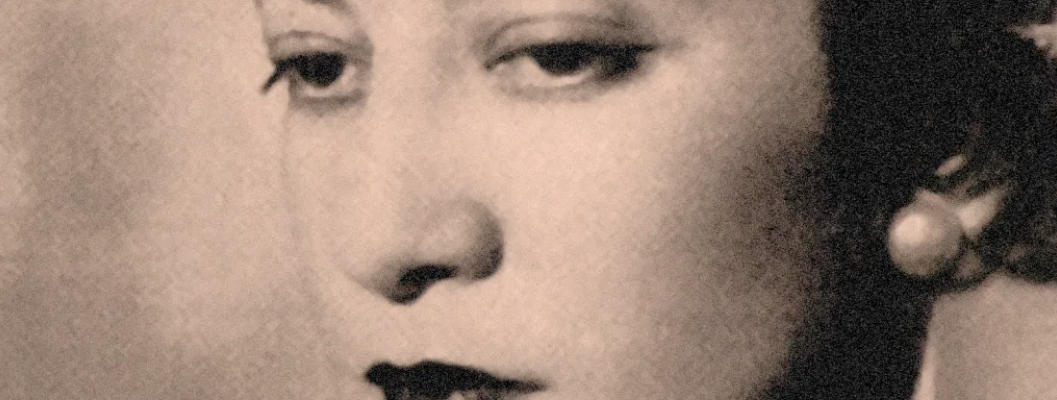Jacqueline Eymar was born June 23, 1922, making this year her centenary. Unfortunately this event seems to have been overlooked, just as she as a pianist has been largely neglected despite a not-insignificant number of studio recordings as well as broadcast and filmed performances, many of which have not been made public. In an attempt to rectify the lack of attention paid to this magnificent artist, this page will feature a number of performances, as well as a French documentary about the artist.
Eymar was a pupil of Yves Nat whose name has recently become a bit better known thanks to YouTube uploads and the recent availability of rare broadcast recordings. She made a number of LPs in the 1950s that show her playing of both great power and tremendous refinement, with a few later performances recorded as well.
In 1953 she set down for the Philips label accounts of Franck’s two masterpieces Prélude, Choral, et Fugue and the Prélude, Aria, et Final – both played with the amazing cohesiveness, power, and refinement that characterize all the performances I have heard.
Here she is in an absolutely superb traversal of Brahms’ massive Variations and Fugue on a Theme by Handel Op.24 from a 1957 Le Chant du Monde LP. As always, Eymar plays on a grand scale, with a massive dynamic range, incredible power, and a complete command of the technical demands of the work, yet without any harshness or loss of clarity or line. Her timing is impeccable and her strength never compromises sensitivity to nuance. There is a keen sense of intelligence and logic to her interpretations, bringing a sense of inevitability to her playing – this is a work recorded by some of the greatest pianists on disc, and even amongst these titans Eymar’s reading is thoroughly convincing and satisfying.
Here is another Chant du Monde LP, from one year later, featuring Eymar playing the music by Fauré.She plays here with an enormous palette of tonal colours, marvellous phrasing, natural timing, refined dynamic shadings, and wonderful pedalling that adds atmosphere without every obscuring clarity.
00:00 Nocturne No.1
06:54 Impromptu No.2
10:33 Barcarolle No.2
16:58 Impromptu No.5
19:07 Nocturne No.6
28:12 Valse-Caprice No.3
About a decade later, she released some chamber music recordings, among them the first Quartet and Quintet of Fauré – here are those two recordings, showing not just the fine pianism found in all of her recorded performances but also fantastic ensemble with her partners.
Fortunately her discography has been supplemented with the release of some broadcast recordings, notably in a 2-disc set on Meloclassic that is fortunately still available – click here (I wholeheartedly recommend the release). But many other performances remain unissued or hard to obtain, such as this rare LP issued in 1961 that includes live performances from a tour of the USSR. As always, Eymar plays on a grand scale, with a massive dynamic range and incredible power, without any aggressiveness or losing the shaping (Scarbo is stupendous in this regard). Her timing is impeccable and her strength does not override sensitivity to nuance: she produces amazing colours and her pedal technique is astounding.
00:00 – Ravel Gaspard de la nuit
19:31 – Debussy Images
33:21 – Chabrier Idylle (from 10 Pièces Pittoresques)
37:24 – Yves Nat – Le Bûcheron (from 6 Preludes)
There appear to be a number of filmed performances of the artist that would be wonderful to have more readily available. Here is a supremely refined and idiomatic 1965 performance of Debussy’s Danseuses de Delphes (Prélude 1, Premier Livre) – impeccable timing and nuancing!
At the time I originally made this post, only the closing few minutes of a vivacious 1971 concert account of the Brahms D Minor Concerto were visible via Meloclassic, but someone else has uploaded the entire performance. Despite the orchestra not always being in sync with the soloist, the performance is notable for her power and poetry: even when Eymar played with tremendous strength, there is utter beauty of tone and incredibly clear voicing of lines and motifs.
To close, a 40-minute documentary (in French) that offers biographical information along with interviews of those who knew her and some more filmed performances – a wonderful exploration of the marvellous musician. It is to be hoped that more will be done in the future to preserve this great pianist’s superb artistry.
